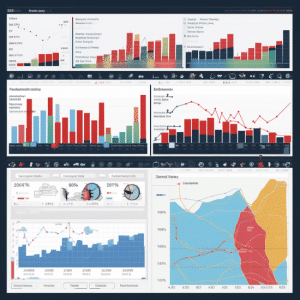AI within Supply Chain
Artificial intelligence (AI) is increasingly being used within the supply chain to improve efficiency, reduce costs, and increase overall performance. AI systems can analyze vast amounts of data to identify patterns and trends that can be used to optimize operations and make more informed decisions.

Predictive Analytics for Accurate Demand Forecasting
One way in which AI is being utilized within the supply chain is through the use of predictive analytics. These systems use data from past performance and other relevant factors to forecast future demand, allowing companies to more accurately plan for production and inventory levels.
Improving Forecasting and Inventory Management
In addition, AI is being used to improve forecasting and demand planning, as well as to optimize inventory management. By analyzing data on demand patterns, lead times, and other factors, AI systems can help companies to determine the most cost-effective way to order and restock inventory.
Optimizing Routes and Delivery Times
AI is also being used in logistics and transportation to optimize routes, reduce fuel consumption, and improve delivery times. For example, AI systems can analyze data on traffic patterns, weather conditions, and other factors to determine the most efficient routes.
Artificial Intelligence (AI) is revolutionizing the supply chain, enabling companies to improve efficiency, reduce costs, and enhance overall performance. Through advanced AI systems, businesses can analyze vast amounts of data to identify significant patterns and trends. These valuable insights allow for operations optimization and informed decision-making, fostering sustainable growth.
One of the key areas where AI has a major application is predictive analytics for demand forecasting. AI systems utilize past performance data and other relevant factors to forecast future demand accurately. This capability enables companies to precisely plan their production and stock levels. By anticipating demand, they can avoid stockouts and surpluses, resulting in more efficient resource management and increased customer satisfaction.

AI is also widely used in logistics and transportation to optimize delivery times. By analyzing data on traffic patterns, weather conditions, and other factors, AI systems can determine the most efficient routes for delivery trucks. This reduces transportation costs, improves delivery punctuality, and minimizes environmental impact through reduced fuel consumption.
Furthermore, AI is a valuable tool for improving forecasting and inventory management. By analyzing data on demand patterns, lead times, and other factors, AI systems assist companies in determining the most cost-effective way to order and replenish stocks. This optimization of stock levels reduces warehousing costs and helps avoid issues related to overstocking or stockouts, ensuring better customer satisfaction and increased profitability.
Discover how AI can transform your supply chain and propel your business to new heights. Join us today to benefit from the invaluable advantages of AI in supply chain management.
